|
|
|
Sort Order |
|
|
|
Items / Page
|
|
|
|
|
|
|
| Srl | Item |
| 1 |
ID:
119284
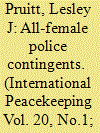

|
|
|
|
|
| Publication |
2013.
|
| Summary/Abstract |
This article focuses on women's involvement in peacekeeping operations and the introduction in 2007 of an all-female formed police unit (FFPU). Possible benefits and challenges of deploying all-female contingents in peace operations are considered and feminist theories of international relations are drawn upon to evaluate arguments for including women in peace and security missions. Media discourses on the Indian FFPU deployed to Liberia in 2007 are analysed, revealing a potential to reshape attitudes about the role of women in peace and security, and emphasizing that femininity need not be incompatible with strength and capacity for protection.
|
|
|
|
|
|
|
|
|
|
|
|
|
|
|
|
| 2 |
ID:
152317
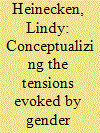

|
|
|
|
|
| Summary/Abstract |
The South African military has adopted an assertive affirmative action campaign to ensure that women are represented across all ranks and branches. This has brought about new tensions in terms of gender integration, related to issues of equal opportunities and meritocracy as well as the accommodation of gender difference and alternative values. The argument is made that the management of gender integration from a gender-neutral perspective cannot bring about gender equality, as it obliges women to conform to and assimilate masculine traits. This affects women’s ability to function as equals, especially where feminine traits are not valued, where militarized masculinities are privileged and where women are othered in ways that contribute to their subordination. Under such conditions, it is exceedingly difficult for women to bring about a more androgynous military culture espoused by gender mainstreaming initiatives and necessary for the type of missions military personnel are engaged in today.
|
|
|
|
|
|
|
|
|
|
|
|
|
|
|
|
| 3 |
ID:
176493
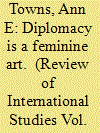

|
|
|
|
|
| Summary/Abstract |
The aim of this article is to examine whether and how diplomacy may be gendered, symbolically and rhetorically, using US representations of diplomacy as a case. Prior scholarship on gender and contemporary diplomacy is sparse but has shown that the symbolic figure of ‘the diplomat’ has come to overlap tightly with ‘man’ and be associated with traits often attributed to masculinity. Inspired by queer international relations methods, relying on the concept of ‘figuration’ and focused on US news media and biographies of diplomats from the past decade, this article uncovers and examines a palette of feminised figurations also at play in US representations of diplomacy, including the diplomat as ‘the “soft” non-fighter’, ‘the relationship builder’, ‘the gossip’, ‘the cookie-pusher’, and ‘the fancy Frenchman’. These feminised figurations alternate between configuring the diplomat as a woman and – more commonly – a (feminised) man. The analysis complicates rather than displaces existing claims, highlighting the importance of attention to slippages and challenges to dominant masculinised subject positions.
|
|
|
|
|
|
|
|
|
|
|
|
|
|
|
|
| 4 |
ID:
142055
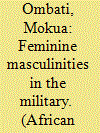

|
|
|
|
|
| Summary/Abstract |
Historically, the military presents more defined gender boundaries than any other state institution. Assignment to traditionally non-feminine roles means crossing gender-assigned and constructed boundaries. This article explores the interplay of the contradictory dynamics of gender in the military through the lens of Kenyan women combatants in the war against al-Shabaab insurgents in Somalia. Military combat roles have traditionally relied on and manipulated ideas about masculinity and femininity. The study uses the twin theoretical frameworks of sociocultural capital and cultural scripts, refined by a gender-framing perspective, to interpret the sociocultural attitudes of masculinity and femininity in terms of war, the military and militarism.
|
|
|
|
|
|
|
|
|
|
|
|
|
|
|
|
| 5 |
ID:
131774


|
|
|
|
|
| Publication |
2014.
|
| Summary/Abstract |
Drawing on twelve months of fieldwork in suburban Hyderabad, this paper explores the double binds experienced by middle-class young women as they attempt to meet the competing demands of 'respectable' and 'fashionable' femininity. For middle-class women, respectability requires purposeful movement, demure posture and modest clothing when in public, as well as avoidance of lower-class spaces where men congregate. Status can, however, also be achieved through more revealing fashionable clothing and consumption in elite public spaces. Whilst respectability for some sections of the middle class necessitates avoidance of even platonic relationships with the opposite sex, upper middle-class informants encourage heterosociality and for some upper middle-class and elite youth pre-marital romance is a form of 'fashion' due to its location in high-status spaces of leisure and consumption. The tensions described in this paper reveal the fragmentation of Hyderabad's middle class and the barriers to social mobility experienced by women for whom the relationship between legitimate cultural capital and feminine modesty is becoming increasingly complex.
|
|
|
|
|
|
|
|
|
|
|
|
|
|
|
|
| 6 |
ID:
133831
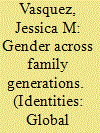

|
|
|
|
|
| Publication |
2014.
|
| Summary/Abstract |
How do conceptions of gender - attitudes, expectations, and behaviours - change from generation to generation in Mexican American families? The notion of gender as socially constructed allows for the possibility of change, yet existing studies documenting change provide insight into why gender changes occur but do not sufficiently describe how this process happens. Based on interviews with three-generation Mexican American families in California, this article finds that reflection on natal family experiences and intergenerational family communication - autobiographical stories, lessons, and advice - are mechanisms that shift masculinity, femininity, and gender relations. Men use their natal family dynamics to rethink male dominance in favour of improved familial and romantic relationships whereas women consider their biographies and cross-generational advice to challenge patriarchy and become more educated and assertive. Families are crucibles of social change: reflection on natal family experiences and communication that crosscuts family generations actualise and initiate paradigm shifts about
|
|
|
|
|
|
|
|
|
|
|
|
|
|
|
|
| 7 |
ID:
175564
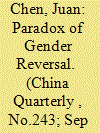

|
|
|
|
|
| Summary/Abstract |
This study examines the masculinity of Chinese male migrants who earn their living as “dance hosts.” Dance hosts partner middle-aged women in dance halls, sell experiences of intimacy and engage in ongoing romantic relationships with their female clients. This article seeks to capture an intimate and “up-close” portrait of (heterosexual) male dance hosting, and then further addresses dance hosts’ masculine subjectivity by examining the coping strategies they use to overcome the stigma attached to their profession and to assert their masculinity. Ultimately, the article argues that the process of masculine subjectivity formation in the case of male dance hosts is structured by dominant norms of Chinese masculinity. Although seemingly highly subversive, the relationship between dance hosts and clients in fact fulfils conventional gender ideals and encourages the perpetuation of traditional gender roles in China's patriarchal society. This work seeks to offer an understanding of traditional gender norms (or ideals) through the lens of normative Chinese masculinity within the context of a stigmatized occupation.
|
|
|
|
|
|
|
|
|
|
|
|
|
|
|
|
| 8 |
ID:
147389
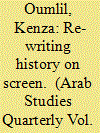

|
|
|
|
|
| Summary/Abstract |
This article examines how the award winning film Salt of This Sea (2008) responds to dominant gendered representations of Arab and Palestinian identity. The choice of this film is based on its significance as a contemporary cinematic text that aims to present alternative portrayals to those prevalent in the media. Furthermore, Annemarie Jacir is the first Palestinian female filmmaker to make a full-length feature film. The film puts a courageous female character (Soraya—played by Suheir Hammad) at the center of its narrative. It refreshingly departs from inflicting a male gaze on the lead female actor. Salt of This Sea responds to the dominant construction of Arab and Muslim women as passive with the portrayal of a determined heroine. In regard to portrayals of masculinity, the film attempts to challenge the core stereotype of Palestinian men as violent. Overall, the film is part of a movement to re-write a collective history, but it depicts dimensions of Palestinian history that are seldom shown in the mainstream media.
|
|
|
|
|
|
|
|
|
|
|
|
|
|
|
|
|
|
|
|
|